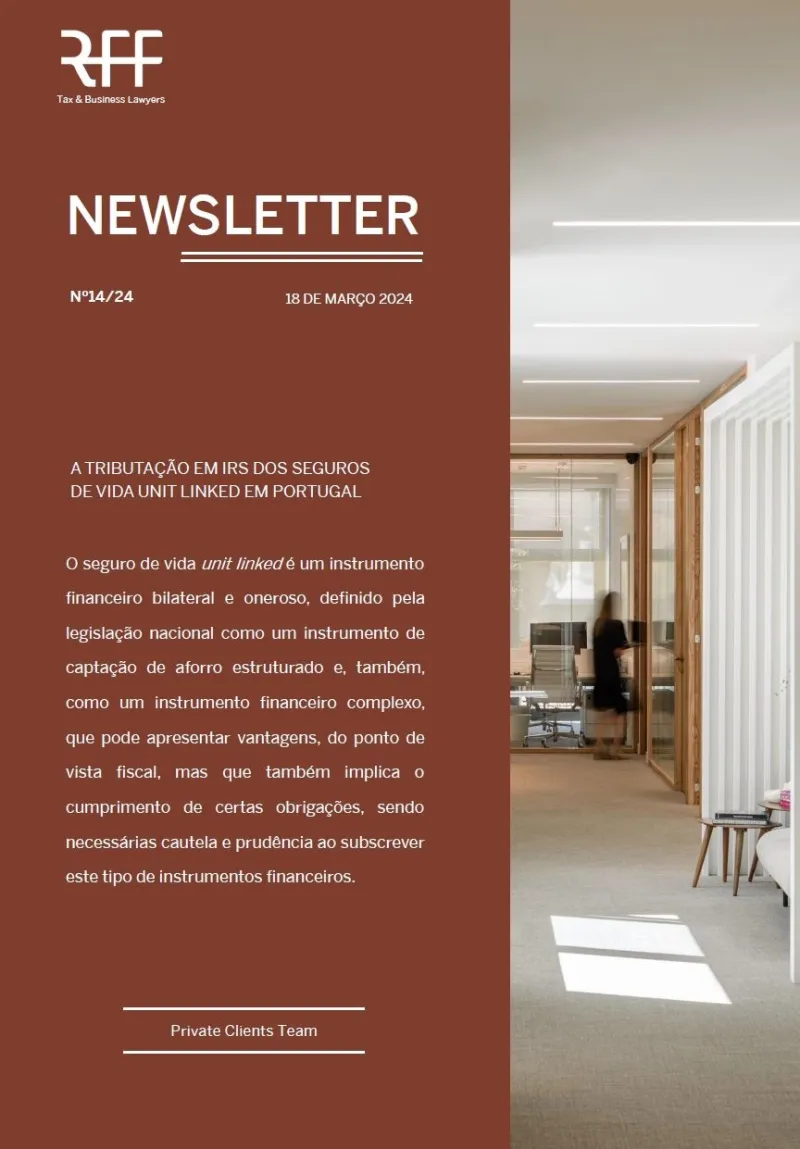Personal income taxation of Unit-linked life insurance in Portugal

Personal income taxation of Unit-linked life insurance in Portugal
The unit-linked life insurance is a bilateral and onerous financial instrument, defined by national legislation as a structured savings collection instrument, and also as a complex financial instrument, which may present advantages from a taxation perspective, but also entails the fulfillment of certain obligations. Subscribing to this type of financial instrument requires caution and prudence.
INTRODUCTION
Unit-linked life insurance is a bilateral and onerous financial instrument, defined by national legislation as a structured savings collection instrument, and also as a complex financial instrument, which may present advantages from a fiscal perspective, but also entails the fulfillment of certain obligations. Subscribing to this type of financial instrument requires caution and prudence.
The holder of a policy of this type should receive a right or a set of rights from the counterparty (i.e., the insurer or insurance company) which guarantees, according to the specific conditions of the contract entered into, the right to a fixed or variable amount of income, according to the investment undertaken, for the policyholder or other beneficiaries appointed by the policyholder.
However, it is relevant to note that the subscription to this type of instrument entails certain risks, which should be considered beforehand by the subscriber.
In any case, the associated risk with this investment depends entirely on the situation of the entity offering the service, the type of insurance, and the conditions agreed upon by the parties.
As with any other type of investment, the risks associated with unit-linked insurance depend on the entity in which one invests, and it is advisable to study the management presented by the entity in question before the investment is concluded.
THE RULES APPLICABLE TO RESIDENTS AND NON-RESIDENTS
According to the general rules of the Portuguese Personal Income Tax (“PIT”) Code, taxpayers who are considered tax residents in Portugal are taxed over all their worldwide income.
Conversely, those who are non-residents only have the obligation to declare income from Portuguese sources and are only taxed on those.
Therefore, if a Portuguese tax resident decides to subscribe to one of these insurances, they will have to fulfill their reporting obligations to the Portuguese Tax Administration and may have to pay tax on the income earned, regardless of the country of origin of the income.
However, in the case of non-residents, the reporting (and contributory) obligation will only apply if the insurance entity is Portuguese.
Nevertheless, as previously mentioned, subscribing to this type of insurance implies the verification of several relevant taxable moments (i.e., subject to taxation), so it is important to distinguish them and understand how each moment may be taxed.
THE CONSTITUTION OF THE INSURANCE POLICY AND THE TRANSFER OF ASSETS TO THE INSURER
At the time of subscribing a unit-linked life insurance policy, the policyholder may choose to make their capital input in cash or in kind, i.e., by transferring assets they already own.
It is important to note that the insurer will not merely act as a custodian of the assets, but rather as an investor, being stipulated in the policy that the assets transferred in kind become the property of the insurer, hence it can be concluded that this input implies the transfer of ownership of the assets to the insurance entity.
Indeed, in such cases, there will be a transfer of assets from the legal sphere of the policyholder to the legal sphere of the insurer, which may correspond to an onerous disposal generating a taxable capital gain under category G of PIT, the calculation of which depends on several factors.
Generally, capital gains generated by this transaction will correspond to the difference between the realization value (value upon entry/registration in the insurer's sphere) and the original acquisition value of each asset by the policyholder, with such difference being subject to taxation under PIT at a rate of 28% (or at marginal rates if the taxpayer opts for aggregation).
Finally, regarding the timing of the respective transfer, it is worth noting that under information exchange regimes, especially the Common Reporting Standard, the establishment of a unit-linked insurance policy in a jurisdiction belonging to the European Union will lead to the automatic communication of this fact to the Portuguese Tax Administration.
TAXATION ON THE REDEMPTION, ADVANCE PAYMENT, AND MATURITY OF THE INSURANCE
Since assets are transferred with the aim of generating more income, they will, as a rule, continue to be capitalized. Indeed, in the vast majority of cases, the generated values are not immediately distributed to the policyholder or beneficiaries, and it is certain that there will be no taxation under PIT until there is effective distribution of income.
However, in certain cases, the policyholder may opt for the redemption, advance payment, and/or early maturity of the insurance, being this payment qualified as capital income (category E of PIT), namely, the positive difference between the amounts paid as redemption, advance payment, or maturity of life insurance (specifically the case of unit-linked life insurance policies) and the respective premiums paid, or amounts invested.
However, whenever the amount of premiums, amounts, or contributions paid in the first half of the contract’s term represents at least 35% of the total period, the income paid is excluded from taxation under the following terms:
- 1/5 (i.e., 20%) of the income if the redemption, advance payment, or other form of early availability, or maturity, occurs after 5 and before 8 years of the contract’s term; or
- 3/5 (i.e., 60%) of the income if this occurs after the first 8 years of the contract’s term.
In summary, if the life insurance is subscribed with a Portuguese institution, the income earned by a tax resident in Portugal will be subject to PIT at effective rates of 28%, 22,4%, or 11,2% (depending on the number of years since its establishment and at the date of redepmtion, advance payment or maturity of the policy).
In the case of the insurance policy be contractualised with a foreign insurer, the income distributed to a Portuguese tax resident will be subject to the same taxation rules and rates.
Should the taxpayers hold the special non-habitual resident ("NHR") tax status and assuming the insurance contract is made with a foreign entity, any exemption will only apply if the applicable Double Taxation Convention and the qualification of this type of income by it allows it, in conjunction with the specific rules of the NHR regime. If this is not the case, taxpayers subject to reporting obligations in Portugal and receiving this type of income will be subject to the general rule as explained earlier.
As for taxpayers benefiting from the new fiscal incentive regime for scientific research and innovation, introduced by the State Budget Law 2024, an exemption from PIT on income earned through the redepmtion, advance payment, and/or early maturity of the insurance policy shall apply, insofar the foreign source of this type of income.
Finally, it is worth noting that in the event of the policyholder’s death, the indemnity payment provided for under the insurance policy will be excluded from PIT taxation in the beneficiaries' sphere. Thus, the settlement of the insurance triggered by the death of the policyholder does not imply taxation of the distributed income in the beneficiaries' sphere.
However, as previously mentioned, if the settlement occurs prior to the death event and for a different reason, the distributed income may be subject to a 28% tax rate (with the aforementioned reductions, which can reduce the effectively applicable rate to 11,2%) or the application of marginal rates, if aggregation is chosen.
On a final note, it is relevant to underline that premiums and commissions related to this type of insurance policies are exempt from Stamp Duty in Portugal.
CONCLUSIONS
We consider that these instruments can be an interesting way to diversify taxpayers' investments, but they should be preceded by a careful and detailed study prior to the decision to proceed with the contracting, especially considering that the associated risk is intrinsically related to the type of insurance acquired and the conditions agreed upon between the parties.
In fact, in the event of the insurer's insolvency, for example, there is a considerable risk of loss of the invested amounts, although, according to the applicable European supervision rules to the sector, such risk is somewhat controlled, and even though the investor assumes the position of preferred creditor of the insolvent estate of the insurer.
In summary, this type of investment may prove to be advantageous considering, also, the perspective and tax framework to which the generated income will be subject.
***
Rogério Fernandes Ferreira
Duarte Ornelas Monteiro
Joana Marques Alves
Raquel Silva Simões
Ana Sofia Gariso
Amélia Carvela
Carlos Alcântara Neves
João Aguiar Câmara
Nicolas Corrêa Simonini
